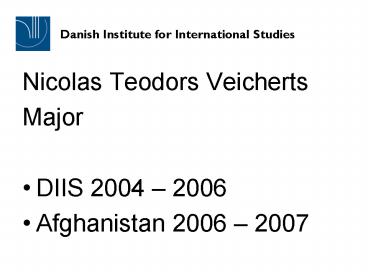Danish Institute for International Studies - PowerPoint PPT Presentation
1 / 12
Title:
Danish Institute for International Studies
Description:
The overall end-state of interventions today is to create ... (ruins, wounded, homeless, polution) HUMANITARIAN TASKS: (camps, food, water, medical assistance, ... – PowerPoint PPT presentation
Number of Views:50
Avg rating:3.0/5.0
Title: Danish Institute for International Studies
1
Danish Institute for International Studies
- Nicolas Teodors Veicherts
- Major
- DIIS 2004 2006
- Afghanistan 2006 2007
2
My basic arguments
- The overall end-state of interventions today is
to create lasting stability in a country or
region. The mean is democracy. - The support from the local population is the
centre of gravity of interventions today. - The wars of the West are easily won.
- ? War planning prior to an intervention should be
based on post-conflict planning and not the other
way around. - Post-conflict planning should be led by civilians
and a civilian effort from the beginning of the
post-conflict phase must be guaranteed. - The military main effort in the post-conflict
phase must be guided by civilian objectives.
3
My agenda
- Some definitions of my own
- Some characteristics of today's interventions
- so what does concerted planning and action (CPA)
require? - Conclusion 1 2
4
A SKETCH OF AN INTERVENTION
PLANNING
H
H
GENOPBYGNING UDVIKLING
Lasting stability gt Democracy
CIVILIAN (DEVELOPMENT) EFFORT
MILITARY EFFORT
H
CONFLICT
POST CONFLICT
Months
5 12 years
5
DEVELOPMENT TASKS Infrastructure
projects Water/sanitation, education, training,
governance, industry, elections.
3-block-warfare
MILITARY TASKS Policing, destroying
spoilers (ruins, wounded, homeless, polution)
HUMANITARIAN TASKS (camps, food, water, medical
assistance, coordination, communikation)
6
What do we know about the interventions of today
(1/3)
- The local population is the centre of gravity.
- People do not distinguish between
- negative peace (i.e. security) and positive
- peace (i.e. infrastructure, jobs, justice
etc.). - This calls for an early and guaranteed
- civilian effort.
- The civilian effort ? the neglect of the
- former regime.
7
What do we know about the interventions of today
(2/3)
- The West is guaranteed to win the initial
- (traditional) military battle.
- Collateral damages are limited.
- The importance of war effort is reduced.
- The post-conflict plan becomes more
- important than the war plan.
8
What do we know about the interventions of today
(3/3)
- The West is guaranteed to win the initial
(traditional) - military battle.
- The local population is the centre of gravity.
- ? This calls for an early civilian effort.
- The opponents main target is the centre of
- gravity ? stop any progress.
- The opponents do not distinguish
- humanitarian efforts from other civilian
- efforts.
- ?The civilian effort must be protected.
9
so what does concerted planning and action
require? (1/2)
- Prior to an intervention
- Be sure to have a post-conflict plan that
focuses on - what the people need and want.
- Nationally (Iraq), regionally (Basra), locally
(DK AOR). - Plan x Organisation Timetable.
- Since the post-conflict plan is about developing
a - country it should be done by civilian
experts supported - by the military.
- The war plan should create the exact
preconditions - mentioned in the post-conflict plan and
not just the - best possible.
10
so what does concerted planning and action
require? (2/2)
- In the post-conflict phase
- Continuously to improve the livelihood of the
- people calls for a continued civilian effort.
- ?The military should focus on securing the
civilian effort - (man-to-man, not a zone defence).
- ?Creating and up-holding security is still an
important task.
11
Conclusion (1)
- ? Beside an overall coalition post-conflict and
development plan all contributing nation should
develop a post-conflict plan of their own that
both the military and civilian effort in their
AOR should follow. - The military cannot have their own security as
priority number one. It has to be the security -
in its broadest sense - of the local population. - Military and civilian leaders should be measured
on their ability to fulfil the conditions set-up
in the post-conflict plan. - Since the civilian effort is key Western
governments must have a vacuum-filling capacity
for crises where the security situation prevents
IOs, NGOs and others from operating. - ?For-profit companies or willing NGOs
(state-sponsored) - could provide such capacities.
12
C2 What about the necessary independent, neutral
and impartial humanitarian aid?
- ?Make a clear distinction between core
humanitarian work (food, water, medicine,
temporary housing) and other civilian efforts
(schools, housing, demining) - They might also be humanitarian but accept
that an enemy will see the NGOs as Western
end-state enablers. - Allow only the Red Cross and its affiliates to
use WHITE colours. - Create a global value around the WHITE efforts
and be careful with the definition of these.































